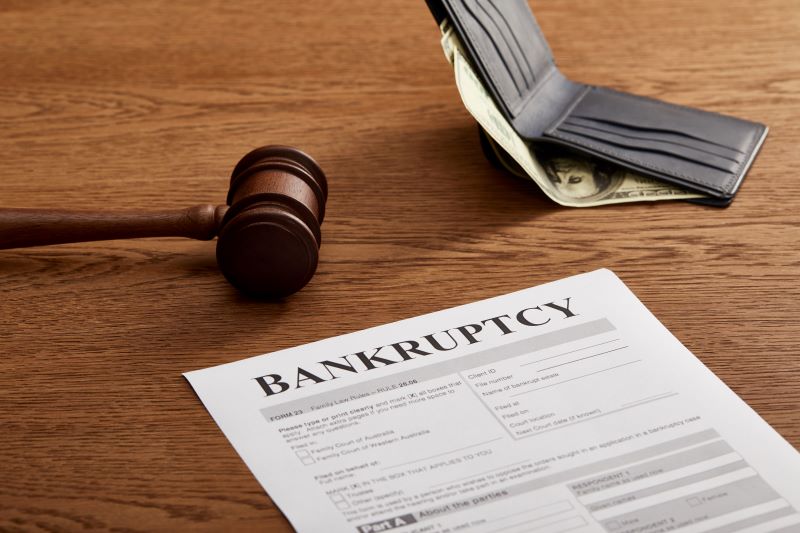
Filing for bankruptcy can be daunting, especially when financial constraints are already weighing heavily. At our Charlotte law firm, we understand our client’s challenges and strive to provide accessible and affordable bankruptcy solutions. Our goal is to guide you towards financial freedom, offering flexible payment options to alleviate the burden of upfront costs. One of the primary concerns for individuals considering bankruptcy is the ability to afford legal representation. We recognize that if you’re in a position where bankruptcy is necessary, you’re likely facing significant financial difficulties. That’s why we’ve implemented a client-centric approach, allowing you to initiate bankruptcy before making any payments. This demonstration of good faith enables us to begin working on your case, reviewing your information, and providing guidance from the outset.
Bankruptcy Options
Chapter 7 Bankruptcy: A Fresh Start
Our firm offers a straightforward payment structure for those eligible for Chapter 7 bankruptcy. After our initial consultation and review of your financial situation, we request a deposit towards the total fee. This deposit serves as a commitment to move forward with the bankruptcy filing. The remaining balance must be paid in full before we can officially file your case with the court. However, gathering a lump sum can be challenging, so we offer flexible installment plans to accommodate your unique circumstances. The beauty of Chapter 7 bankruptcy lies in its ability to provide immediate relief upon filing. Once your case is submitted, an automatic stay is activated, preventing creditors from attempting to collect on debts. This respite allows you to breathe easier as you navigate the bankruptcy process with our guidance.
Chapter 13 Bankruptcy: A Structured Repayment Plan
For clients with too many assets to fully protect or whose income exceeds the limits for Chapter 7, Chapter 13 bankruptcy may be the more suitable option. This form of bankruptcy involves a structured repayment plan, allowing you to pay back a portion of your debts over three to five years. In these cases, our attorney fees can often be included in the repayment plan, eliminating the need for substantial upfront costs.
Funding Options for Bankruptcy
We understand that gathering funds for bankruptcy can be a significant hurdle. That’s why we offer various funding options to help make the process more accessible:
Family and Friend Support: Your loved ones are permitted to provide gifts to assist with bankruptcy fees. While asking for financial help can be difficult, consider this a step towards permanently resolving your financial challenges.
Tax Refunds: Your tax refund is considered an asset, which you can use to pay for your bankruptcy. This lump sum can be a valuable resource in funding your fresh start.
Installment Plans: If paying the full fee upfront is overwhelming, we can arrange installment plans tailored to your financial situation. This allows you to spread out the payments over a more manageable timeline.
It’s important to note that using credit cards to pay for bankruptcy fees is not permitted, as those debts would survive the bankruptcy process.
Transparent Pricing and Additional Fees
At our firm, we believe in transparent pricing and open communication. For Chapter 7 bankruptcies, we charge a flat fee that covers most of the work involved. In rare cases where additional legal efforts are required to defend against aggressive creditors, we will discuss the potential for additional fees upfront, ensuring you’re fully informed. Furthermore, our flat fee includes court filing fees and any third-party fees associated with your bankruptcy case. We handle these payments directly, streamlining the process for you.
Taking the First Step Towards Financial Recovery
We understand that the decision to file for bankruptcy can be daunting, but it’s often the first step towards regaining control over your financial situation. Our experienced bankruptcy attorneys in Charlotte, NC, are here to guide you through the process, offering compassionate support and tailored solutions. Don’t hesitate to reach out if you’re ready to explore your bankruptcy options and discuss flexible payment plans. Call Layton Law Firm at 704-749-7747 or click HERE to request a consultation. Together, we’ll navigate the path to financial freedom, empowering you to recover with us.
Bankruptcy FAQs
Filing for bankruptcy in North Carolina can be a big decision, and it’s normal to have questions about the process and what it means for your financial future. While everyone’s situation is completely different, there are common concerns we hear from clients when they first consider taking this step. Our Charlotte bankruptcy lawyer can help you understand your options and work toward a solution that fits your needs.
What Happens When You Declare Bankruptcy?
When you file for bankruptcy, the court issues an automatic stay, which temporarily stops most collection actions such as wage garnishments, foreclosures, and creditor calls. You will need to provide detailed information about your income, expenses, debts, and assets.
Depending on whether you file for Chapter 7 or Chapter 13, your debts may be discharged, meaning you are no longer legally responsible for paying them, or reorganized into a repayment plan you can manage over time.
What Is The Income Limit For Bankruptcy In NC?
The income limit applies mainly to Chapter 7 bankruptcy. It is based on the median income for households in North Carolina, which changes periodically. If your income is higher than the median, you may still qualify through a means test that considers your expenses and certain deductions.
Your lawyer can help you determine whether or not you’re eligible. Then, if you do not qualify for Chapter 7, you may be eligible for Chapter 13, which involves a structured repayment plan rather than a full discharge of all debts.
How Much Does It Cost To File Bankruptcy?
Court filing fees are set by federal law and are the same across North Carolina. For Chapter 7 and Chapter 13, the filing fee is typically a few hundred dollars. But keep in mind that there may also be additional costs for required credit counseling and financial management courses, as well as legal representation if you choose to work with an attorney.
Can I Keep My Car If I File Bankruptcy?
Whether you can keep your car depends on the value of the vehicle, how much equity you have in it, and whether you are current on your loan payments. North Carolina law provides certain exemptions that may protect your vehicle up to a specific value. In Chapter 13 bankruptcy, you may be able to include your car loan in your repayment plan and keep the vehicle as long as you make the required payments.
Do I Need A Lawyer To File For Bankruptcy?
You are allowed to file bankruptcy without a lawyer, but the process can be time-consuming and requires detailed paperwork that must be accurate and complete.
Having our Charlotte bankruptcy lawyer work with you can help reduce the chance of mistakes and make the process more manageable. We can also help you determine which type of bankruptcy is right for you and represent your interests in court.
Reach Out To Learn More
At The Layton Law Firm, we understand that deciding to file bankruptcy is a significant choice that can have lasting effects on your finances and future. If you’re dealing with overwhelming debt, our Charlotte bankruptcy attorney is here to help you explore your options and take steps toward a more stable financial path. Contact us today to get started.


